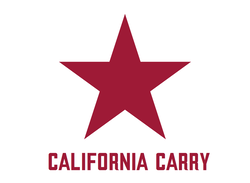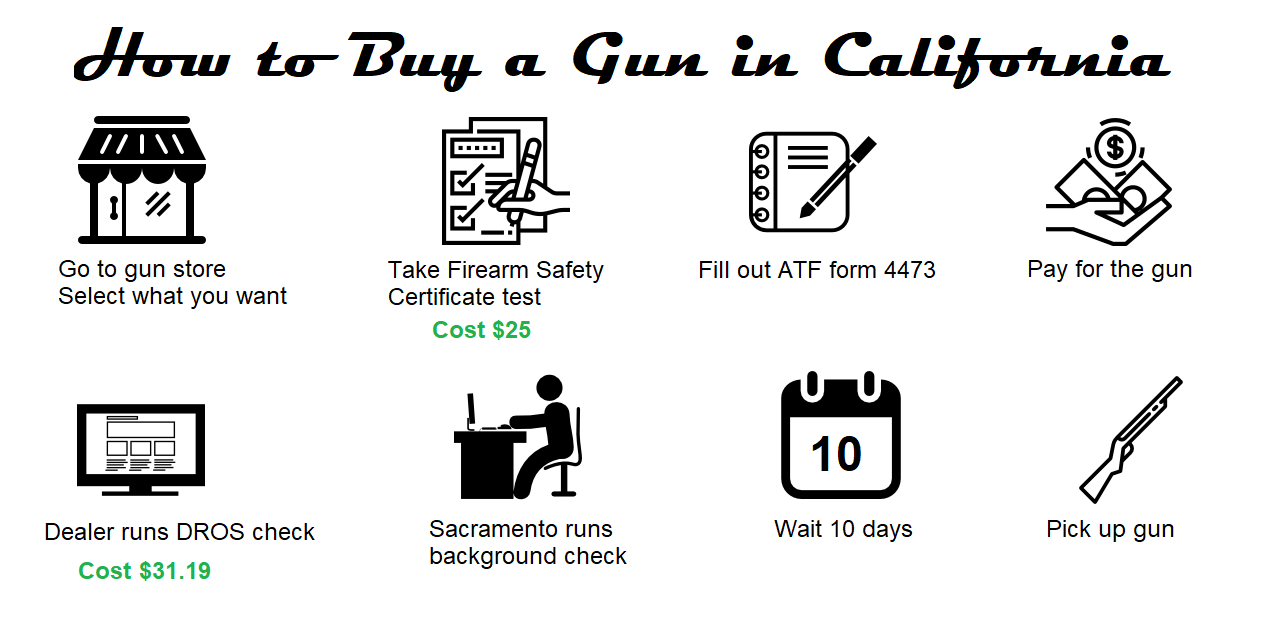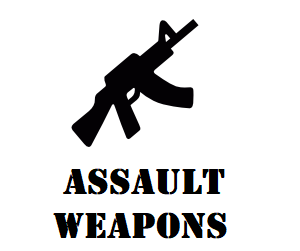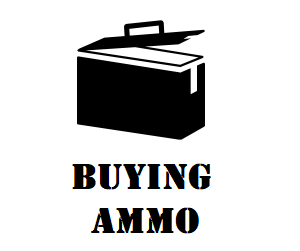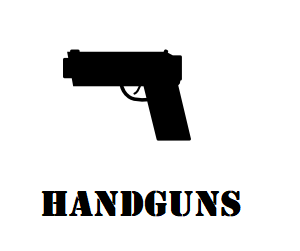Remember: you cannot just order any gun online and have it shipped to your dealer. All handguns sold to normal people in California must be approved and listed on the Certified Handgun Roster. Assault weapons are illegal and semi-auto rifles are highly regulated in California. What you see online may be illegal for you to purchase. If you are unfamiliar with the process call your local gun store/dealer (FFL).
This section is not intended for licensed dealers, their employees, or those with Curio & Relic (C&R) licenses. This is a general introduction intended for the general public that is not readily familiar with California gun laws. This section is intended for first time buyers or past buyers who are not familiar with the current requirements.

"Assault Weapons"
Update 10/19/23: A federal judge has struck down the "assault weapon" ban in Miller v. Bonta, but "assault weapons" are not for sale yet. A 10-day stay has been put in place to allow the state of California to appeal, which they certainly will. Following the magazine shenanigans with the 9th Circuit stalling for time, expect it to be some time before the appeals process wraps up and non-neutered semi-autos are legal again.
Update 10/19/23: A federal judge has struck down the "assault weapon" ban in Miller v. Bonta, but "assault weapons" are not for sale yet. A 10-day stay has been put in place to allow the state of California to appeal, which they certainly will. Following the magazine shenanigans with the 9th Circuit stalling for time, expect it to be some time before the appeals process wraps up and non-neutered semi-autos are legal again.

Body armor banned? 30-day waiting period? No more guns lost in boating accidents law? Private party sales banned? Follow this link to read more about “Gunmageddon” 2023.
Highlights
- There is a 10-day waiting period before you can take your gun home.
- Only one handgun a month may be purchased; in 2021 it becomes one rifle or pistol a month (see details).
- Only certain approved pistols on the Safe Handgun Roster are approved for new sale in California.
- You must have a firearm safety certificate before you can buy a gun (often issued on-site).
- You will pay $31.19 for a background check on a retail gun sale or $41.19 for a private sale.
- Those 18-20 can only purchase .22 rifles or shotguns; no centerfire rifles or handguns.
- Parent/grandparent-to-child transfers may take place without a dealer but have other requirements.
- Loaning firearms to others is possible under specific circumstances and requirements.

I smoke marijuana. Is it legal for me to own a gun?
No. Under federal law, you are an unlawful user of a controlled substance. The 9th Circuit Court of Appeals has upheld this rule. Marijuana in any form, even medicinal, is illegal under federal law, which does not recognize medicinal uses or state laws. Users of marijuana are prohibited persons. Checking 'no' on question 11(e) on the Form 4473 would be a lie if you use marijuana. See this ATF letter on the topic.
No. Under federal law, you are an unlawful user of a controlled substance. The 9th Circuit Court of Appeals has upheld this rule. Marijuana in any form, even medicinal, is illegal under federal law, which does not recognize medicinal uses or state laws. Users of marijuana are prohibited persons. Checking 'no' on question 11(e) on the Form 4473 would be a lie if you use marijuana. See this ATF letter on the topic.
Gun Store Sales
Things to Know Before You Go
Gun stores or gun dealers are federally licensed and known as FFLs (Federal Firearms License or Licensee)
18 USC 922(b) It shall be unlawful for any licensed importer, licensed manufacturer, licensed dealer, or licensed collector to sell or deliver--
(1) any firearm or ammunition to any individual who the licensee knows or has reasonable cause to believe is less than eighteen years of age, and, if the firearm, or ammunition is other than a shotgun or rifle, or ammunition for a shotgun or rifle, to any individual who the licensee knows or has reasonable cause to believe is less than twenty-one years of age.
Per federal law, you must be 21 years old to purchase a pistol. California places additional restrictions on those 18-20, limiting their purchases to .22 rifles and shotguns. You must also be legally able to possess a firearm; most commonly this applies to felons, drug addicts, or domestic abusers.
10-day waiting period
26815. No firearm shall be delivered: |

Note: 10 days is 10 24-hour periods. The background check period beings when the DOJ begins processing the background check. In normal times, this is essentially instant, however, due to the COVID-19 and protests/riots gun panic buying the wait times in California can exceed 14 days. The problem is occurring nationally and is not a California-specific issue. Humans still have to process the background check by typing things in manually and checking various databases; it is not handled by an automatic computer search.
|
27540. A dealer, whether or not acting pursuant to Chapter 5 (commencing with Section 28050), shall not deliver a firearm to a person, as follows: |
What if I already own a gun; does the waiting period apply to me?
Yes it does. The appeal of the ruling (Sylvester v. Harris) that challenged this was not successful. Waiting periods have a very minimal impact on crime. Most violent crimes are impulsive or involve a firearm (or other weapon) that has already been owned for some time. Very few crimes occur with firearms that were purchased on impulse. 30-day pickup window
You have 30 days to pickup your firearm from the date the background check was conducted (27 CFR § 478.102(c)) or you must start the background check and waiting period all over again. Firearm rationing The one-handgun-a-month rule changed effective July 1, 2021. You are only allowed to purchase one handgun or semi-automatic centerfire rifle in a 30-day period. You may still purchase unlimited rimfire (.22) rifles and shotguns. |
Firearm Safety Certificate
Do I need a firearms ID card or something?
No, you will need a Firearm Safety Certificate; while this is a de facto firearm purchase license, its ostensible purpose is to ensure you understand basic gun safety.
No, you will need a Firearm Safety Certificate; while this is a de facto firearm purchase license, its ostensible purpose is to ensure you understand basic gun safety.
26840. (a) A dealer shall not deliver a firearm unless the person receiving the firearm presents to the dealer a valid firearm safety certificate, or, in the case of a handgun, an unexpired handgun safety certificate. The firearms dealer shall retain a photocopy of the firearm safety certificate as proof of compliance with this requirement. Where/when/how do I get this firearms safety certificate?
Usually you can take the test at the gun store the same day. You can also get them through various firearm safety courses. It costs $25. Since I have my license to carry, and I don’t need a FSC, do I still have to get a background check?
Yes. The DROS requirement applies to everyone. In some states, the criteria used to issue carry license meets standards to qualify for an exemption from calling in the background check. This is known as the Brady Exemption or Permanent Brady Permit under federal law. The buyer with a license to carry still fills out the ATF form 4473, but no background check call is made because it is assumed the license would have been confiscated if the person could not own a gun. |
When is a Firearm Safety Certificate not required? Who is exempt?
31700. (a) The following persons, properly identified, are exempted from the firearm safety certificate requirement in subdivision (a) of Section 31615: [omissions made] Note: Military veterans (honorable discharges) no longer qualify for an exemption by showing a DD 214; retirees and active members are in a different group. Hunting licenses do not apply to handgun purchases. Hunting
|
Eligibility and What to Bring
We're starting from the assumption that you are not a prohibited person and you are an adult legal California resident.
|
Must be a California resident to buy a handgun
|
Military Member’s PCS station is their residenc
|
26845. (a) No handgun may be delivered unless the purchaser, transferee, or person being loaned the firearm presents documentation indicating that the person is a California resident. |
27 CFR § 478.11 State of residence. The State in which an individual resides. An individual resides in a State if he or she is present in a State with the intention of making a home in that State. If an individual is on active duty as a member of the Armed Forces, the individual's State of residence is the State in which his or her permanent duty station is located, as stated in 18 U.S.C. 921(b). The following are examples that illustrate this definition: |
|
What else do I need to bring with me?
Your California driver license or your identification card [no temporary ones allowed]. If you are a permanent resident, but not a citizen, bring your “Green Card.” A dissolution of domestic partnership document that contains the legal name of the applicant as a result of the court action.Active duty military should bring your military ID cards and, if not a California resident, a copy of your Permanent Change of Station (PCS). Military spouses do not qualify for the military exemption.
16400. As used in this part, “clear evidence of the person’s identity and age” means either of the following: |
If your ID has the word "Federal Limits Apply" (not a REAL ID), you must also provide proof of citizenship or legal status. These documents can be (11 CCR § 4045.1):
|
|
If your name changed, you need the respective form explaining the reason for the change (11 CCR § 4045.1):
|
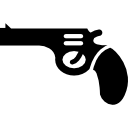
To purchase a handgun, you need additional proof of residency (26845, 11 CCR § 4045). This can be:
|
What the State will not accept
Mailing addresses don’t count. Per the DOJ, the following is unacceptable:
Note that if your driver license/ID card has a mailing address, you will need two additional proofs of residency.
Mailing addresses don’t count. Per the DOJ, the following is unacceptable:
- Active duty military spouse ID
- Bank statement
- DMV address change card (brown card); although if your address changed you’re required to have this, but it alone is not satisfactory.
- Cell phone bill
- Fishing validations and report cards
- Hunting license—standard, self-filled
- Pay stub
- Voter registration
Note that if your driver license/ID card has a mailing address, you will need two additional proofs of residency.
|
Minors and 18-20 year olds
|
Under 21, cannot buy a handgun or semi-auto rifle from a dealer
|
27505. (a) No person, corporation, or firm shall sell, loan, or transfer a firearm to a minor, nor sell a handgun to an individual under 21 years of age. |
27510. (a) A person licensed under Sections 26700 to 26915, inclusive, shall not sell, supply, deliver, or give possession or control of a firearm to any person who is under 21 years of age. Note: 27510 ↑ was passed in response to the Parkland, FL, school shooting and bars those under 21 from purchasing all but shotguns or rimfire rifles, unless you are in the military, then you can purchase a semi-automatic centerfire rifle per (b)(3). This only applies to FFLs (dealers), not special family transfers.
Note: under 27505 ←, those under 21 cannot purchase a handgun. This section does allow for minors and 18-20 year olds to obtain firearms via a temporary loan. It does not apply to parents gifting handguns to 18-20 year olds. However, all other requirements for transferring a firearm would be required. 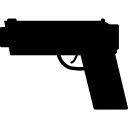
Can 18-20 year-olds own handguns?
Yes, the question is how they obtain them. Per federal law, you must be 21 years old to purchase a pistol. California places additional restrictions on those 18-20, limiting their purchases to .22 rifles and shotguns; see 18 USC 922(b)(1). 25605(b) allows any citizen of the United States or legal resident over the age of 18 years, to purchase, own, possess, keep, or carry, either openly or concealed, a handgun within the citizen’s or legal resident’s place of residence, place of business, or on private property owned or lawfully possessed by the citizen or legal resident. 27505 does not prohibit parents/grandparents giving a handgun to an 18-20 year old. 27510 prohibits dealers (FFLs) from transferring a handgun to those under 21 (also 18 USC 922(b)(1)). Because state law requires firearms to be transferred through a dealer (no private sales) there is no way for a 18-20 year old to legally purchase a firearm privately as they may if they were a resident of other states. The only way for a 18-20 year old to obtain a firearm from a relative (including purchase) would be from a parent or grandparent under 27875. Hunting license and minors after 2025Hunting license regulations for minors change in 2025 per SB 175 (2021): previous year's licenses will not be accepted and the dealer has to "verify" that the license is valid.
Note: ← red words indicates a strikethrough or removed text. Blue words indicates a new addition. See SB 715 (2021-2022).
|
How to Buy a Gun, From a Dealer in Person
Private sales and online order are covered separately. Note this section would apply to online and private sales when the firearm arrives at the gun store.
How exactly does the gun sale work?
You go into the gun store and find the gun you want to buy.
Step 1: the dealer will have you take the FSC test (you will have to pay for this first). If you pass, proceed to Step 2.
Step 2: the dealer will collect your identification and make copies.
Step 3: the dealer will have you fill out the ATF form 4473 (they give you the form).
Step 4: you will pay for your gun and the background check. Your gun will be in “jail” at the store for 10 days. You will be given an exact time and date when you can return for your gun.
Step 4 ½: the dealer will fill out the DROS form and contact Sacramento, who will run the background check.
Step 5: at exactly 10 days (ten 24-hour periods)—assuming you aren’t caught in the massive delays due to panic buying—you return to pickup your gun. At this point, you will do the safe handling demonstration and sign for the gun before returning home with it.
Individual dealers may have slight differences in procedure.
Step 1: the dealer will have you take the FSC test (you will have to pay for this first). If you pass, proceed to Step 2.
Step 2: the dealer will collect your identification and make copies.
Step 3: the dealer will have you fill out the ATF form 4473 (they give you the form).
Step 4: you will pay for your gun and the background check. Your gun will be in “jail” at the store for 10 days. You will be given an exact time and date when you can return for your gun.
Step 4 ½: the dealer will fill out the DROS form and contact Sacramento, who will run the background check.
Step 5: at exactly 10 days (ten 24-hour periods)—assuming you aren’t caught in the massive delays due to panic buying—you return to pickup your gun. At this point, you will do the safe handling demonstration and sign for the gun before returning home with it.
Individual dealers may have slight differences in procedure.
How much are the fees for the background check?
Obviously this is in addition to the cost of the firearm and taxes.
Per the DOJ, an in-state transfer costs:
“The DROS fee is $31.19 which covers the costs of the background checks and transfer registry. There is also a $1.00 Firearms Safety Act Fee, and a $5.00 Safety and Enforcement Fee. In the event of a private party transfer (PPT), the firearms dealer may charge an additional fee of up to $10.00 per firearm. First-time buyers will need to pay $25 for the Firearm Safety Certificate, however, the certificate is good for five years.
Obviously this is in addition to the cost of the firearm and taxes.
Per the DOJ, an in-state transfer costs:
“The DROS fee is $31.19 which covers the costs of the background checks and transfer registry. There is also a $1.00 Firearms Safety Act Fee, and a $5.00 Safety and Enforcement Fee. In the event of a private party transfer (PPT), the firearms dealer may charge an additional fee of up to $10.00 per firearm. First-time buyers will need to pay $25 for the Firearm Safety Certificate, however, the certificate is good for five years.
Firearm Rationing
The one-handgun-a-month rule ends June 30, 2020. On July 1, 2020, it will become one handgun or semi-auto centerfire rifle every 30 days. Semi-auto centerfire rifles most commonly are AR-style or AK-style rifles or Mini-14s, but may other types of firearms. There is no limit on how many rimfire (.22) rifles or shotguns that can be purchased and there is no total ownership cap on how many guns you can own or buy over your lifetime.
Note: The exceptions applicable to normal people are exchanging/replacing a firearm, replacing a lost or stolen gun, or the firearm is being returned to you (i.e. from a gunsmith).
Note: The exceptions applicable to normal people are exchanging/replacing a firearm, replacing a lost or stolen gun, or the firearm is being returned to you (i.e. from a gunsmith).
|
Applies to the buyer
|
Applies to the dealer
|
27535. (a) A person shall not make an application to purchase more than one handgun or semiautomatic centerfire rifle within any 30-day period. This subdivision does not authorize a person to make an application to purchase both a handgun and semiautomatic centerfire rifle within the same 30-day period. |
27540. A dealer, whether or not acting pursuant to Chapter 5 (commencing with Section 28050), shall not deliver a firearm to a person, as follows: |
Click the images to learn more about purchasing the above items
